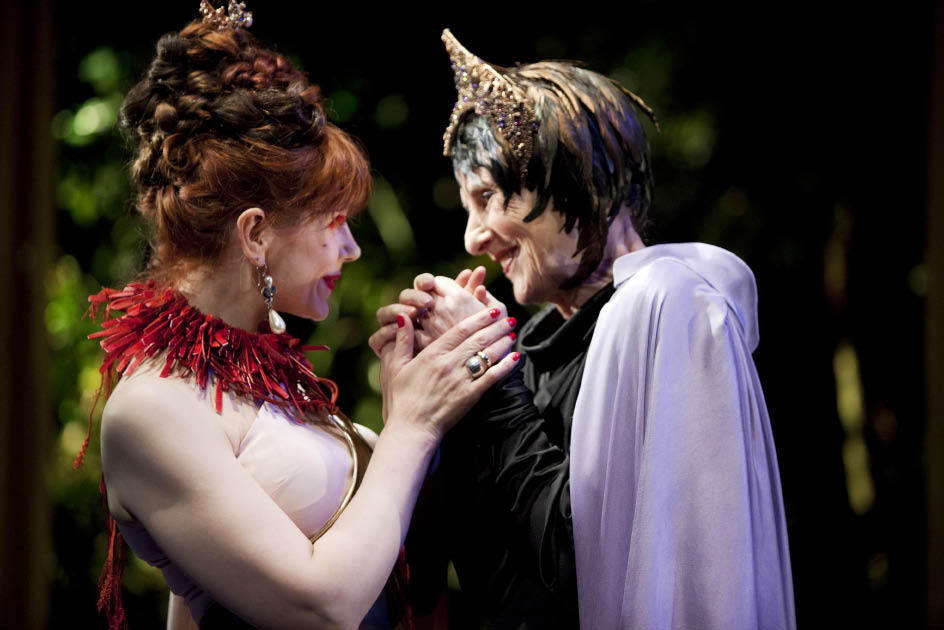Dido, Queen of Carthage
Cottesloe
The Overcoat
Lyric Hammersmith
Simple plays can be the hardest to get right. James Macdonald has made a dogged assault on the earliest work of Christopher Marlowe. The story is lifted wholesale from Virgil. After Troy’s fall Aeneas arrives in Carthage where Dido promptly falls in love with him. When destiny compels Aeneas to leave for Italy the despairing queen sets fire to herself, and her palace, in a humungous health-and-safety fiasco. Marlowe’s underdeveloped grasp of personality weakens the script. Both major plot-twists — Dido’s infatuation and Aeneas’s departure — are contrived by the gods not by the characters themselves, and this lack of psychological complexity isn’t compensated for by the verse and its occasional flashes of loveliness. The production looks like a rush job done on a nuppence budget. An assured burst of visual charm is needed to sweep us into Marlowe’s mythical neverland. Instead, we get a maisonette. The gods are upstairs behind a yellow drape representing Elysium. The mortals are down below in front of a blackboard partly painted purple. The continent of Africa is suggested by a spillage of mauve granules on the floor. And the detached-retina school of design has been busy in Wardrobe, too. Ganymede wears punk trousers. Winged Mercury has feathers in his ears. Siobhan Redmond’s buxom Venus trembles beneath a Statue of Liberty robe. The Trojans have Elizabethan costumes but the Carthaginians are on their way to a Star Trek convention, and they do that special salute (kiss fist, touch heart) which in sci-fi films indicates the Civilised Alien.
Could great acting lift this muddle heavenwards? Mark Bonnar has a handsome, even a noble head, which surmounts a squat, stubby prop-forward’s body. A useful companion if you want a door forced open but there’s no heroism or profundity in his earnest, wounded Aeneas. As Dido, Anastasia Hille rejects the doomed queen’s grandeur and mystery and plays her as a skittish Sloane determined to score at her first speed-dating event. When the lovers kiss there’s no chemistry and too much physics. They’re like opposed magnets shoved together. As often with Marlowe, one leaves in a mood of thwarted desire. The pre-Shakespearean foothills always sharpen one’s appetite for the silvery summits themselves.
Gogol is another writer whose work can vanish like a snowflake in careless hands. His slight and mystifyingly durable short story The Overcoat has been adapted by Gecko and their actor-manager Amit Lahav. The result is a cast-party crossed with a chimpanzees’ tea party. Instead of 19th-century Russia we’re in Europe during the 1920s. The characters speak smatterings of French, cod-Italian and an unidentified Slavic tongue. And for some reason Gogol’s hero is presented as a Kafkaesque martyr, a neglected cog groaning and squealing in the military-industrial bulldozer. Once he gets his coat the story swells into a Dante-esque ballet of damnation and redemption done with prog-rock lighting and complex sound effects. Mystified, I turned to the programme, where a communiqué from the director explained the furious co-mingling of influences and ideas that help the troupe towards their ‘final concept’. Patience is required and a constant readiness ‘to pick up the “emails” as your brain sends them through’. The audience is prized, like ‘a character, or the lighting’. So that’s why I came out hot, glassy and in need of shade.
As far as I could see the concept was this. Spend a month going mad in a rehearsal room and create a barrage of dances, songs, sketches, bits of mime, bits of Fritz Lang, bits of jazz and kabuki music and hope no one notices it’s a great big splat of intellectual Onanism. That’s how this felt, I’m afraid. A handjob with footnotes. And as far from Gogol as Tony McNulty is from the Order of Merit.







Comments